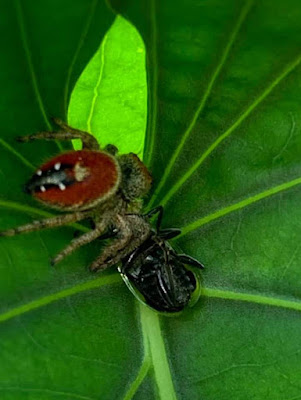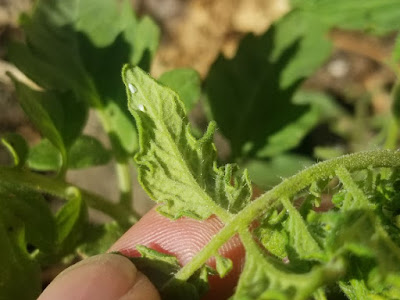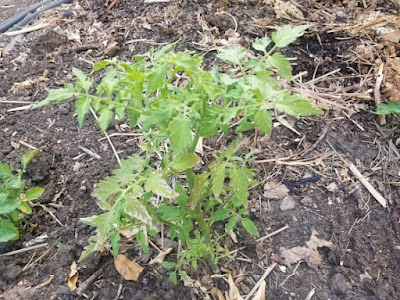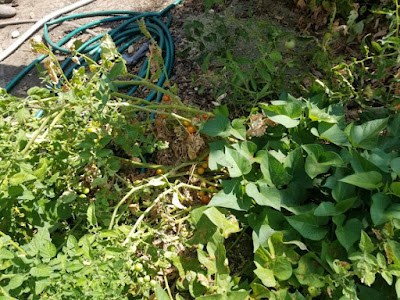Friday, October 24, 2025
Pillbug Decimation
Friday, April 25, 2025
Bug Vacuum Pros and Cons
Having received tales of gallant gardeners ridding cucurbits of the dreaded cucumber beetle with the use of a handheld vacuum cleaner, I decided to give a bug vac a try. As there are a number of options for the bug vacuum cleaners, and because I have not tried any other than the one that I purchased, I will not compare it with any others. However, I do have some things to consider when using a bug vacuum.
In addition to looking at product reviews, it may be helpful to find a vacuum that has a long thin attachment. Mine did not. So, in order to make sure that my bug vac could catch the little cucumber beetles, I used the outer case of a marker and pushed it into the vacuum attachment, taping the sides to keep the pressure. With this done, the vacuum exhibited enough pressure to easily suck up a cucumber beetle or other critter that would bother my plants.
So here are some of the pros and cons of a bug vac:
Pros:
-Able to pick up bugs without having to squish them.
-Able to surprise cucumber beetles to keep them from flying off.
-Good with spotted cucumber beetles, which tend to be higher on the plants
-Able to suck beetles while flying
-Able to isolate a large number of beetles from the plants in a relatively short amount of time (generally a time saver)
Cons:
-Having to keep and maintain another piece of equipment
-Having to leave the vacuum outside to have the beetles cook and remembering to bring the bug vac back inside
-Not as effective as nets with airborne beetles
-Not very effective with striped cucumber beetles, which tend to drop from the plant and burrow into the ground
-Limited amount of time that the vacuum will run before the battery requires recharging.
While there were a number of negative things about the bug vac that I used, I believe that the concept, in general is sound. Bug vacs save growers time in combating cucumber beetles and, while they do not completely eliminate the pressures from cucumber beetles, consistently utilizing bug vacs greatly reduces the damage to both the plants and the fruit.
Friday, August 16, 2024
Cucumber Beetles Aplenty, Cucumber Beetles Galore!
While many other astrological and lunar calendars were marked by the presence of one animal or another, 2023 was, for me, "The year of the Cucumber Beetle".
Never have I experienced cucumber beetles in such numbers in my life. I spent well over 50 hours combating them in order to realize a harvest of some of the varieties that I was growing. Two-thirds of the varieties that I was growing were so profoundly impacted by them that they produced a drastically decreased harvest that was not worth sharing with others.
Altogether, the only good thing about the cucumber beetles was when I was done with them. The end of the season provided me with much needed relief. Given the amount of work I put into these plots, I am hesitant to attempt growing in those plots again.
Friday, August 9, 2024
My Experience with Cucumber Beetle Traps and Lures
In a desperate attempt to control the onslaught of cucumber beetles infesting my two Suisun Valley plots, I purchased some yellow sticky traps and pheromone lures for cucumber beetles. Let’s just say that they did not produce the desired results.
Instead of mostly killing off cucumber beetles the traps mostly caught bees and butterflies. I even checked to make sure that I had purchased the correct product for the species of beetle I was trying to remediate. The results were was pretty sad. Either the beetles have undergone adaptations that make it so that they don’t care for the traps and lures or the traps and lures never worked to begin with.
In any case, I returned the remainder of the traps and lures to the company that I purchased them from and hope that I will never purchase another product that will unintentionally injure or kill off my beneficial insect friends.
Friday, July 12, 2024
The Conquered Conqueror Cucumber
I received seeds of a parthenocarpic cucumber variety from the Seed Saver’s Exchange collection by the name of Conqueror. It was supposed to be an English variety that was parthenocarpic. English cucumber varieties are prized for being good to grow in greenhouses and parthenocarpic varieties would be ideal in those conditions because the vines produce fruit without pollination.
Unfortunately, something about the climatic conditions of 2023 along with a nearby pumpkin patch that overwintered cucumber beetle pupae all combined to make the situation for the Conqueror cucumber harvest dismal at best.
Every week I was fighting the cucumber beetles. I even purchased sticky traps that did not work and pheromones that didn’t work either. In the end, the endeavor was a nearly complete loss. I did manage to collect seed from one or two fruit, but the amount and quality of seed was much less than I would have anticipated in the number of plants that I was growing.
So, I will likely try growing the Conqueror Cucumber again. Hopefully this next time, they will at least be given a fighting chance.
Friday, October 14, 2022
Jumping Spider Eating Cucumber Beetle
For all of you dealing with cucumber beetles, don't forget to keep your beneficial insects around.
Thanks to Di P. Regan shared these pictures in a Facebook Gardening Group.
Friday, September 30, 2022
The Rise and Fall of Tomatoes
2021 was not a very good tomato year for me. To date, that would make over half of my years as a gardener now. Honestly – some people have a gift for growing tomatoes while others, like myself, experience every kind of pest, pathogen and persistent pressure that promotes pitiful production. This year it was leaf curl, courtesy of some menacing whiteflies.
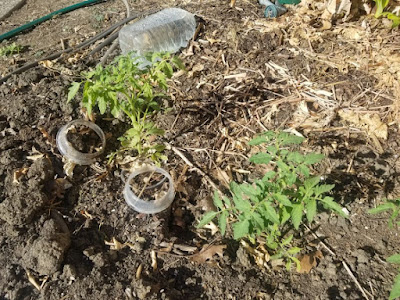
While I had some some beautiful Taxi tomatoes that got taken out by the whiteflies, but I had some Ace 55 plants that took over. The Ace 55s were okay, but something kept making holes in them just as they would begin to ripen. My daughter also brought by a hybrid cherry tomato plant, which kind of did its own thing.
We gardeners tend to be an optimistic lot, so – here’s to next season!
Friday, September 16, 2022
Some Thoughts about Integrated Pest Management
With all the posts about "good" and "bad" bugs, I really wanted to mention something. Just as plant roots suffer without healthy bacteria (those of you with clorinated pools near your garden know what I am talking about) I believe that my garden suffers without some amount of insect life. Specifically, what I am referring to is the lowly aphid.
Though a gardener may prefer to have no aphids at all, I believe that having a mild number of aphids on my plants is really good. Why? Because aphids are the foundation insect for many of the beneficial insects I appreciate in my garden. Ladybugs, lace wings, hoverflies, parasitic wasps, other wasps, assassin bugs, mantids, spiders, etc.
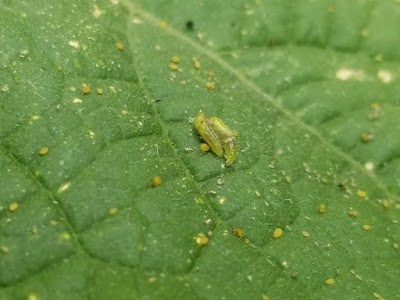 |
| Syrphid Fly larvae eat aphids |
 |
| Ladybird beetle larvae love aphids too |
While I do work to reduce aphid populations before they really damage any one plant, I believe that using an Integrated Pest Management approach helps to keep garden pests in perspective. Instead of fighting my gardening problems, I much prefer to let nature to take care of some of my pests (excluding cucumber beetles) before I really need to.






























